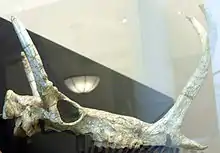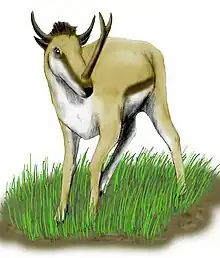| Synthetoceras | |
|---|---|
 | |
| Skull of S. tricoronatus | |
| Scientific classification | |
| Domain: | Eukaryota |
| Kingdom: | Animalia |
| Phylum: | Chordata |
| Class: | Mammalia |
| Order: | Artiodactyla |
| Family: | †Protoceratidae |
| Genus: | †Synthetoceras Stirton, 1932 |
| Type species | |
| †Synthetoceras tricornatus Stirton, 1932 | |
| Species | |
| |
Synthetoceras tricornatus is a large, extinct protoceratid, endemic to North America ( Nebraska ) during the Late Miocene, 10.3—5.3 Ma, existing for approximately 5 million years. Fossils have been recovered from Nebraska and Texas.[1]
Description

Life restoration of S. tricoronatus
With a length of 2 m (6.6 ft) and a mass of 150–200 kg (330–440 lb), Synthetoceras was the largest member of its family.[2][3] It was also the last, and had what is considered to be the protoceratids' strangest set of horns.[4] The two horns above its eyes looked fairly normal and similar to those of many modern horned mammals, but on its snout it had a bizarre, long horn with a forked tip that gave it a Y-shape. Only males had this strange horn, and they probably used it in territorial fights.[2]
References
- ↑ "Synthetoceras tricornatus". fossilworks. Retrieved 17 December 2021.
- 1 2 Palmer, D., ed. (1999). The Marshall Illustrated Encyclopedia of Dinosaurs and Prehistoric Animals. London: Marshall Editions. p. 273. ISBN 1-84028-152-9.
- ↑ Janis, C. M., Theodor, J. M., & Boisvert, B. (2002). Locomotor evolution in camels revisited: a quantitative analysis of pedal anatomy and the acquisition of the pacing gait. Journal of Vertebrate Paleontology, 22(1), 110–121.
- ↑ Geist, V. (1966). The Evolution of Horn-Like Organs. Behaviour, 27(1-2), 175–214. https://doi.org/10.1163/156853966x00155
Further reading
- R. C. Hulbert and F. C. Whitmore. 2006. Late Miocene mammals from the Mauvilla Local Fauna, Alabama. Bulletin of the Florida Museum of Natural History 46(1):1-28
- Prothero D.R., 1998. Protoceratidae. pp. 431–438 in C.M. Janis, K.M. Scott, and L.L. Jacobs (eds.) Evolution of Tertiary Mammals of North America Cambridge University Press, Cambridge.
This article is issued from Wikipedia. The text is licensed under Creative Commons - Attribution - Sharealike. Additional terms may apply for the media files.